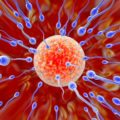
Working with adolescent male and mature female hamsters, researchers have found that sex during adolescence can have effects on the body and the chemistry of the brain that last well into adulthood. Researchers Zachary Weil and Randy Nelson, both from Ohio State University’s Department of Neuroscience, say the findings may be applicable to understanding human sexual development. The work was presented yesterday at the Society for Neuroscience annual meeting in Washington, D.C.
Weil and Nelson found that those male hamsters with early-life sexual experience (at around 40 days old, the equivalent of a human’s mid-adolescence) later showed more signs of depressive-like behaviors as well as lower body mass, smaller reproductive tissues and changes to cells in the brain than did hamsters that were first exposed to sex later in life or to no sex at all. Previous research has shown that certain genes become activated in fruit flies during courtship.
Cell changes observed in the sex-exposed adolescent males included:
- Higher levels of expression of a gene associated with inflammation in their brain tissue.
- A smaller total body mass as well as a decrease in accessory reproductive tissue.
- Less complex cellular structures in key signaling areas of the brain.
- A stronger immune response to a sensitivity test – a potential sign of an autoimmune problem.
- Higher levels of the pro-inflammatory cytokine interleukin-1 (IL-1) in their brain tissue.
Weil explained that IL-1 is one of several chemical messengers that cause inflammation, most often to fight infection or repair injury; when it circulates without an infection to fight, the body experiences excess inflammation.
This elevated gene expression was seen in areas of the brain known not to reach maturity until well into adulthood – including the amygdala, prefrontal cortex, hippocampus and striatum. In some of these same areas of the brain, animals with adolescent sexual experience also showed less complexity in the dendrites, the branching segments from nerve cells that house the synapses. “Sex is doing something physiological that these cells are interpreting and responding to with shorter dendrites,” Weil said.
Related:
Discuss this article in our forum
The joy of sex – courtesy of parasites
Female companions boost male fertility
Twin-study findings conflict with sex ed dogma








Comments are closed.